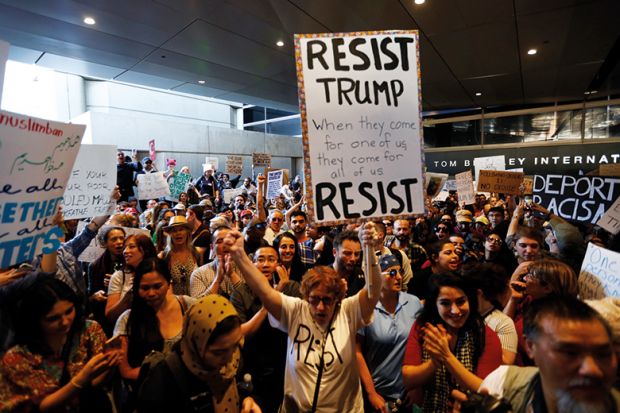Universities located in states that voted for Donald Trump are less likely to have offered support to international students affected by the US president’s ban on travel from six majority-Muslim countries, academics have revealed.
The US Supreme Court allowed the implementation of the bar on travel from Iran, Libya, Syria, Yemen, Somalia and Chad while legal challenges against it continue, in a ruling issued last week. North Korea and Venezuela are also affected by the restrictions.
In a new analysis covering 300 US higher education institutions, scholars at Clemson University in South Carolina show how senior leaders’ responses to Mr Trump’s initial executive order announcing the travel ban, which dated to January 2017 (and covered Iraq instead of Chad), were shaped by their local circumstances.
They find that universities located in states that voted for Mr Trump were twice as likely to have made no response to the executive order compared with institutions in states that backed Hillary Clinton: 34.4 per cent of providers in Republican states said nothing, compared with 16.6 per cent of campuses in Democratic states. Universities in "blue" states were twice as likely to issue a robust condemnation of the order as their counterparts in "red" states (32.4 per cent versus 15.9 per cent).
Universities in Trump-supporting states were also less likely to have offered support for students or academics from countries named in the order, for example by holding town hall discussions or offering online advice, say Andrew Pyle, Darren Linvill and Paul Gennett in the journal Public Relations Review.
The study also found that universities with a low number of international students were less likely to have condemned the executive order or to have offered support.
Dr Linvill, an assistant professor in Clemson’s department of communication, said that the findings “do suggest that institutions often responded to the executive order in a way consistent with their best interests and not always in a way consistent with institutional values”.
Although it was “not surprising” that universities reacted in this way, he continued, “what was disappointing to me as an educator was that institutions in states that voted for Trump were less likely to reach out to their international students and offer guidance”.
“It seems likely that efforts to avoid the subject and remain apolitical caused some institutions to neglect their responsibility to communicate with faculty and students,” Dr Linvill said. “Institutions from our sample in red-leaning states were more than twice as likely to make no response at all relative to their peers in blue states, not even a notification of the event or an offering of support.
“An argument can be made that an institution should remain apolitical; higher education is beholden to a variety of stakeholders with a variety of values. The decision not to wade in to the immigration debate, however, should not alleviate them of the responsibility of care for their graduate student population.”
Clemson offers an interesting case study in itself. An initial response to the executive order, described as “rather tepid” in the new paper, triggered a week-long hunger strike involving more than 15 staff and students, forcing the release of a “much more strongly worded” statement.
Register to continue
Why register?
- Registration is free and only takes a moment
- Once registered, you can read 3 articles a month
- Sign up for our newsletter
Subscribe
Or subscribe for unlimited access to:
- Unlimited access to news, views, insights & reviews
- Digital editions
- Digital access to THE’s university and college rankings analysis
Already registered or a current subscriber?





